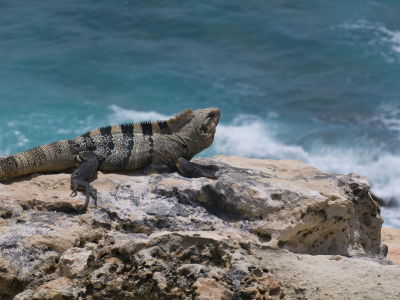The history of penguins may be a clue to the question, 'Can penguins survive global warming?'

Penguins, which are birds but cannot fly and swim and hunt in the sea, are distributed over a wide area of the Southern Hemisphere from Antarctica to the Galapagos Islands. Inverse, a scientific media outlet, reports that research on the evolution of penguins can provide clues to the question, 'Can penguins survive global warming?'
Genomic insights into the secondary aquatic transition of penguins | Nature Communications
Will penguins survive climate change? Their past may reveal the answer
https://www.inverse.com/science/penguins-adapted-to-the-extreme-environments-study
Penguins are slow to evolve, making them vulnerable to climate change
https://www.nationalgeographic.com/animals/article/penguins-are-slow-to-evolve-and-vulnerable-to-climate-change
The penguins' ancestors are believed to have inhabited the continent of ' Zealandia ,' which once existed on the eastern side of Australia, about 60 million years ago. At the time of writing, most of Zealandia has sunk to the seabed, but some remain on land as New Zealand and New Caledonia.
It is believed that the ancient penguins that inhabited Zealandia then rode the Antarctic Circumpolar Current , which flows eastward around Antarctica, to South America and Antarctica. However, there are still many mysteries about the evolutionary history of penguins, which have quite strange characteristics and ecology compared to other birds. So an international research team has provided morphological and biogeographic data, including the genomes of all still-living penguins and 27 recently extinct taxa, as well as 47 taxa in which fossils have been found. I tried to clarify the evolutionary history of penguins by analyzing them and comparing their genomes with other birds.

Research has shown that the major climate changes that have occurred on Earth in the past have profoundly influenced the evolution of penguins, including the emergence of diverse species. For example, about 16 to 5.3 million years ago, the entire earth became extremely cold and glaciers in Antarctica expanded, but at this time the ancestors of penguins living in modern cold regions were born. In addition, penguins that lived in high latitudes have been isolated for about 2 million years, and species have diversified. When the
In addition, from the penguins genome analysis, various penguins such as hard flippers and waterproof feathers suitable for swimming in water, underwater vision and oxygen control ability useful for diving, thick skin and fat to maintain body temperature, etc. Inherent genetic adaptation was confirmed. 'These adaptations have allowed penguins to settle in the most extreme environments on the planet,' the research team wrote.
Chengran Zhou, co-lead author of the paper and studying genome evolution and animal adaptation at BGI-Research, a biotechnology company based in Shenzhen, China, said: 'Global cooling and major ocean currents , Seems to be the main factor shaping the diversification of penguins and biogeographic patterns. ' 'Penguins are the most interesting product of evolution,' said Daniel Ksepka, co-author of the treatise and avian paleontologist. 'They adapted to a completely different body shape and life plan from their ancestors.'
The study showed that penguins adapted well to past climate change and found that heavier weights tended to evolve faster. Cold climate species such as emperor penguins tend to be larger, suggesting that 'larger species in colder regions are more capable of adapting to new climate-induced environments.' The team pointed out. 'This study shows that penguins have adapted to a constantly changing world over the last 60 million years. We are optimistic about the future of penguins,' said Zhou.

However, although penguins have undergone rapid evolution in the early stages of evolution and adapted to water, the evolution rate has dropped significantly since then. As a result, it has been pointed out that penguins may not be able to adapt to the rapid climate change of today, and Ksepka said that some penguins are already on the verge of extinction. I think there are. '
Related Posts:







